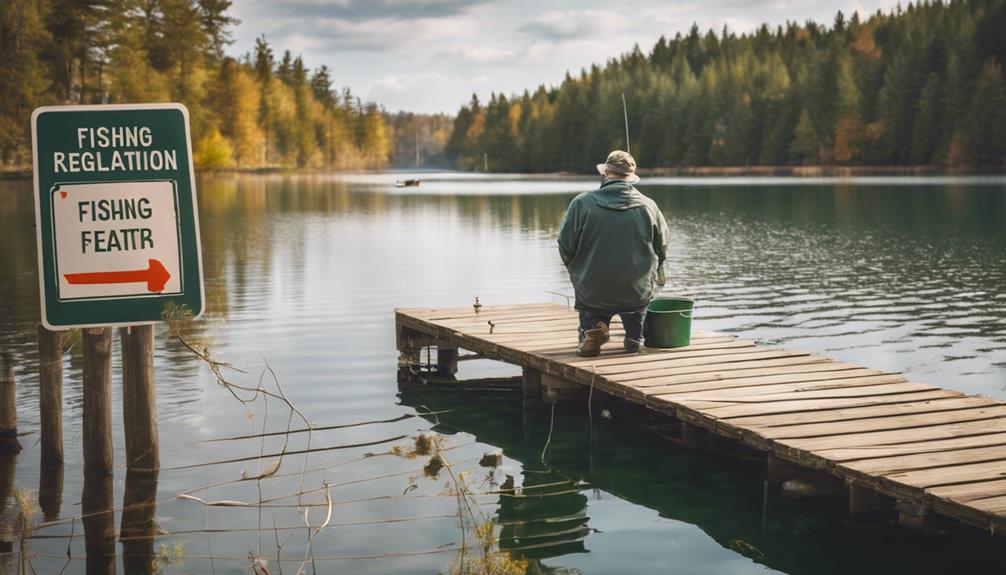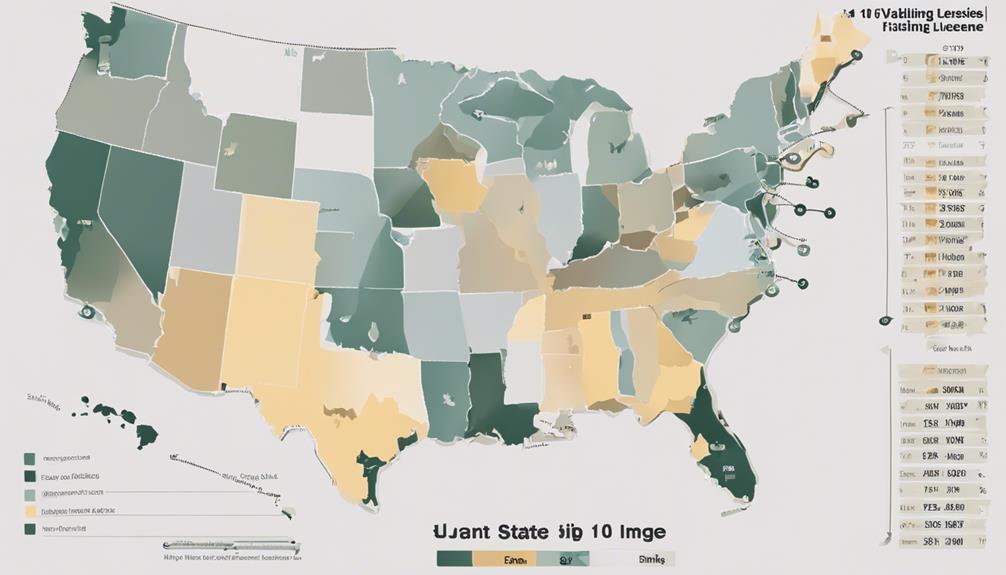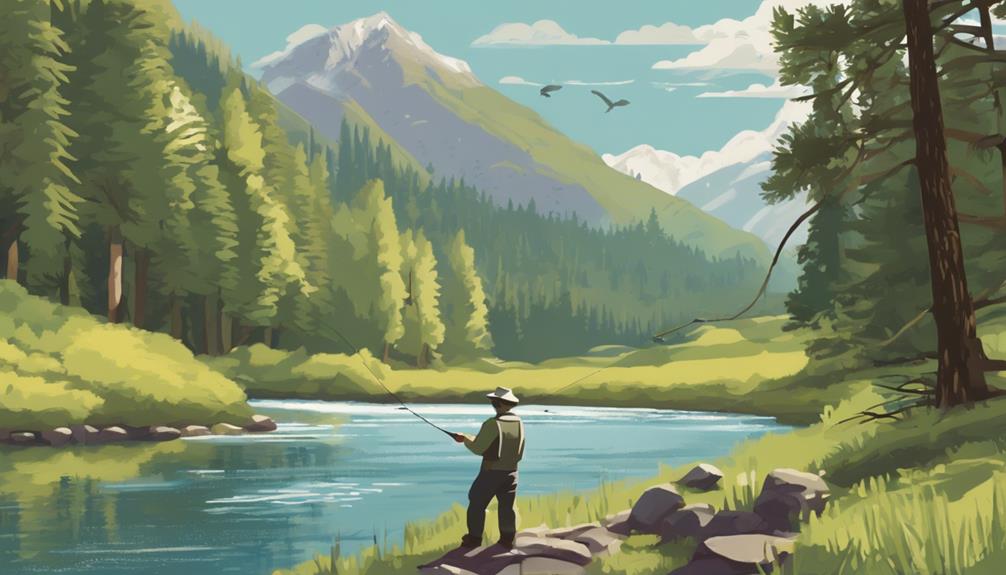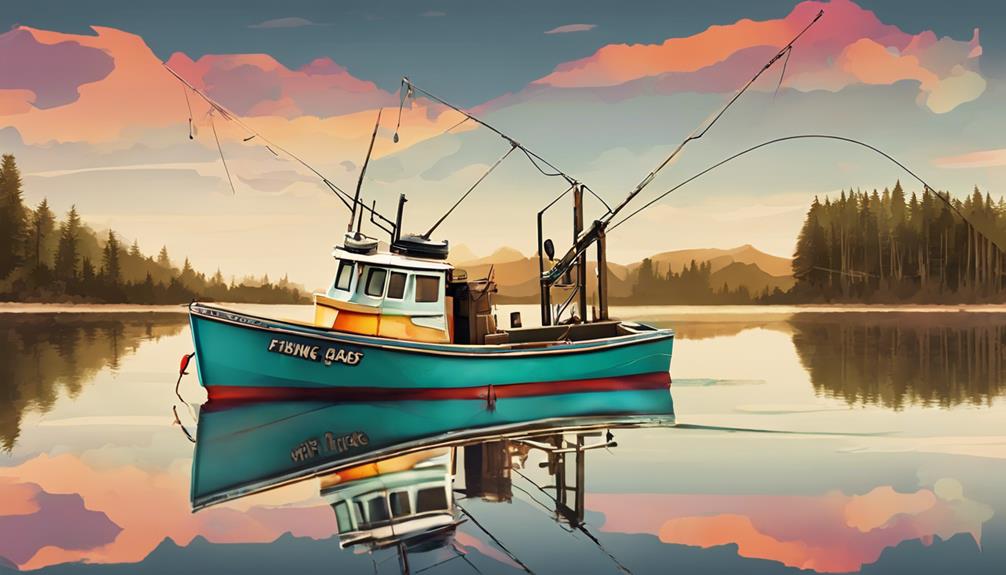Imagine a lake teeming with fish, a vibrant ecosystem where balance is key. Just like how careful management ensures the health of that lake, implementing effective off-season fishing regulations is vital for the sustainability of fish populations.
But what are the best practices that can help achieve this delicate balance between conservation and recreation? Let's explore nine key strategies that can guide policymakers, anglers, and conservationists in ensuring the long-term viability of our aquatic resources.
Importance of Off-Season Fishing Regulations
Why are off-season fishing regulations crucial for maintaining fish populations and ensuring sustainable fishing practices?
Off-season fishing regulations play a vital role in promoting conservation awareness and implementing sustainable practices in the fishing industry. By restricting fishing activities during certain times of the year, these regulations help protect fish populations from overexploitation and ensure their long-term viability.
Conservation awareness is a key aspect of off-season fishing regulations. By designating specific periods when fishing is prohibited or restricted, authorities can educate the public about the importance of giving fish populations time to replenish and grow. This not only helps prevent the depletion of fish stocks but also fosters a deeper understanding of the delicate balance that exists in marine ecosystems.
Moreover, off-season fishing regulations contribute to sustainable practices by allowing fish species to spawn and reproduce without disturbance. This ensures that there are enough mature fish to sustain the population and support continued fishing activities in the future. By aligning fishing practices with the natural reproductive cycles of fish, these regulations help maintain a healthy balance between harvesting and conservation.
Understanding Closed Fishing Seasons
Understanding Closed Fishing Seasons is essential for complying with off-season fishing regulations and contributing to sustainable fishing practices. By recognizing the significance of closed fishing seasons, you can actively participate in protecting marine ecosystems and ensuring the longevity of fish populations.
Here are four key points to help you grasp the importance of closed fishing seasons:
- Seasonal Impact: Closed fishing seasons are strategically implemented to coincide with critical periods in a fish species' life cycle, such as spawning or migration. This timing allows fish populations to reproduce and replenish without human interference, ultimately sustaining healthy stocks for the future.
- Environmental Protection: During closed fishing seasons, marine habitats have the opportunity to recover from the stress of commercial and recreational fishing activities. This respite supports the overall health of the ecosystem, including coral reefs, seagrass beds, and other essential marine environments.
- Ecological Balance: Closed fishing seasons contribute to maintaining the delicate balance within marine food webs. By allowing certain fish species to thrive undisturbed, their natural predators can also access an adequate food supply, promoting a harmonious ecosystem.
- Species Preservation: Protecting vulnerable fish species through closed seasons is crucial for their survival. By giving these populations a chance to grow and mature without human interference, we can prevent overexploitation and potential extinction threats.
Understanding these aspects of closed fishing seasons will empower you to make informed decisions that support sustainable fishing practices and long-term environmental conservation efforts.
Compliance With Catch Limits
Adherence to catch limits is paramount for responsible fishing practices and sustainable resource management. To ensure compliance with catch limits, proper catch documentation is essential. When out fishing, make sure to accurately record the species and quantity of fish caught. This documentation not only helps in monitoring your own catch but also aids in fisheries management efforts.
Enforcement plays a crucial role in ensuring adherence to catch limits. Compliance checks may be conducted by authorities to verify that fishers are staying within the specified limits. It's important to cooperate during these checks and present accurate catch documentation upon request. Failure to comply with catch limits can result in penalties, such as fines or even suspension of fishing licenses. These penalties are in place to deter overfishing and protect fish populations for future generations.
Conservation Measures for Fish Stocks
To ensure the sustainability of fish stocks, implementing effective conservation measures is essential. By following sustainable practices and focusing on resource protection, you can contribute to the long-term health of marine ecosystems.
Here are four key conservation measures to consider:
- Establishing Marine Protected Areas: Designating specific areas where fishing activities are restricted can help fish populations recover and thrive. These protected zones serve as safe havens for marine life to breed and grow without human interference.
- Promoting Selective Fishing Techniques: Encouraging the use of selective gear and practices, such as circle hooks or slot limits, can reduce bycatch and prevent the unnecessary capture of undersized or protected fish species. Selective fishing methods help maintain a balanced ecosystem.
- Implementing Catch and Release Policies: Releasing fish back into the water carefully and promptly can increase their chances of survival. By handling fish properly and using barbless hooks, you can minimize stress and injuries, ensuring that more fish can continue to reproduce and support their populations.
- Supporting Habitat Restoration Projects: Participating in or promoting initiatives aimed at restoring critical fish habitats, such as mangroves or coral reefs, can enhance the overall health of fish stocks. Healthy habitats provide essential breeding grounds and shelter for various species, contributing to their resilience and abundance.
Monitoring and Enforcement Strategies
As you ensure the sustainability of fish stocks through conservation measures, effective monitoring and enforcement strategies play a crucial role in safeguarding these efforts. Utilizing surveillance techniques like drone monitoring can provide real-time data on off-season fishing activities, allowing authorities to pinpoint and address any illegal practices promptly. Drones offer a cost-effective and efficient way to cover vast areas, aiding in the enforcement of off-season regulations that protect vulnerable fish populations during critical breeding periods.
In addition to technological advancements, undercover operations and stakeouts remain valuable tools in monitoring off-season fishing activities. By infiltrating illegal fishing operations, law enforcement agencies can gather evidence and build cases against violators, deterring others from engaging in similar activities. Stakeouts near known hotspots can also help catch offenders in the act, providing concrete proof of violations and reinforcing the consequences of disregarding off-season rules.
Combining these surveillance methods with proactive enforcement strategies creates a strong deterrent against illegal fishing practices during off-season periods. By staying vigilant and employing a variety of monitoring techniques, authorities can better protect fish stocks and preserve marine ecosystems for future generations. Remember, your active participation in reporting suspicious activities and adhering to off-season regulations is vital in upholding the sustainability of fish populations.
Public Education on Off-Season Rules
Educating the public on off-season fishing rules is essential for promoting responsible fishing practices and protecting marine ecosystems. To achieve this, consider the following strategies:
- Outreach programs: Engage with local communities through outreach programs to raise awareness about off-season fishing regulations. These programs can include workshops, seminars, and interactive sessions to educate fishermen and the general public about the importance of adhering to these rules.
- Community engagement: Foster a sense of community responsibility by involving local residents in the conservation efforts. Encourage community members to take an active role in spreading information about off-season rules and their significance in maintaining healthy fish populations.
- Educational campaigns: Launch educational campaigns to reach a wider audience. Utilize various media platforms such as social media, radio, and local newspapers to disseminate information about off-season fishing regulations and the reasons behind them.
- Awareness initiatives: Implement initiatives aimed at increasing public awareness of the impacts of off-season fishing. This could involve partnering with schools, environmental organizations, and local businesses to spread the message about sustainable fishing practices during the off-season.
Collaboration With Local Authorities
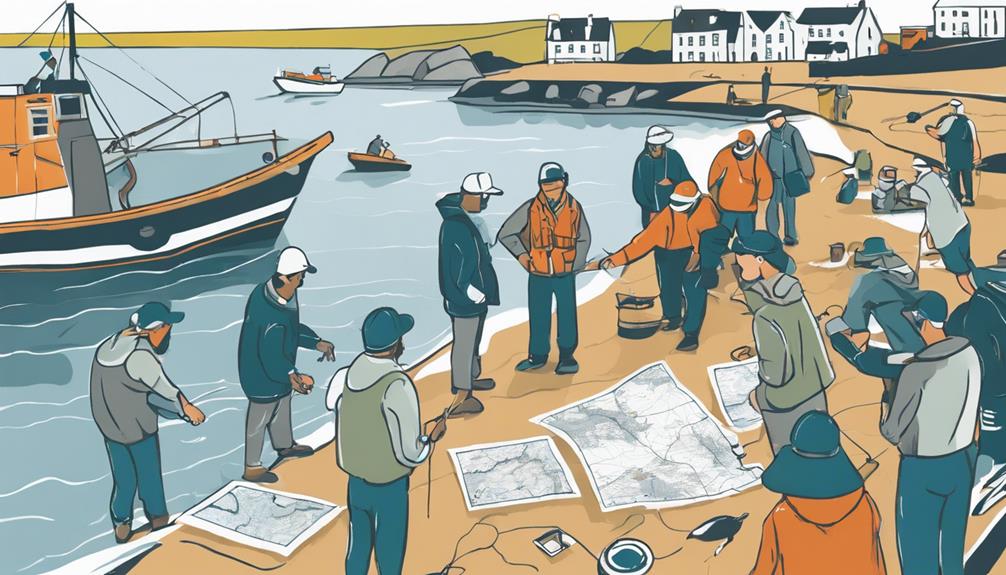
Engage local authorities in your efforts to ensure compliance with off-season fishing regulations and promote sustainable fishing practices. Building strong local partnerships is key to effective enforcement and education. By collaborating with local authorities, you can leverage their resources and expertise to enhance monitoring and enforcement activities during the off-season. Engaging in community engagement initiatives with local partners can also help raise awareness about the importance of adhering to fishing regulations to protect marine ecosystems.
Local partnerships play a crucial role in fostering a culture of compliance within the fishing community. By working closely with local authorities, you can establish clear communication channels to address any issues or concerns related to off-season fishing activities promptly. This collaboration can lead to the development of targeted outreach programs that educate fishers about the benefits of sustainable fishing practices and the consequences of violating off-season regulations.
Community engagement is essential for creating a sense of shared responsibility for the conservation of marine resources. By involving local stakeholders in decision-making processes and seeking their input on off-season fishing regulations, you can foster a sense of ownership and stewardship towards the environment. Encouraging active participation from the community can lead to greater respect for off-season fishing regulations and a more sustainable approach to fishing practices. Remember, collaboration with local authorities and active community engagement are key components of successful off-season fishing regulation enforcement.
Reporting Violations and Feedback
Consider utilizing anonymous reporting mechanisms to encourage transparency and accountability in monitoring off-season fishing violations. Reporting violations promptly is crucial to uphold fishing regulations effectively.
Here are some tips for reporting violations and providing feedback:
- Observe Carefully: Keep an eye out for any suspicious fishing activities during the off-season, such as individuals fishing in prohibited areas or catching restricted species.
- Document Evidence: Take notes, photos, or videos if possible to support your report. This evidence can strengthen the case against violators.
- Report Anonymously: Anonymous reporting mechanisms protect your identity while still allowing you to report violations. This can help overcome fears of retaliation.
- Provide Detailed Information: When reporting violations, be as specific as possible. Include details like the date, time, location, and a description of the violation to aid authorities in their investigation.
Frequently Asked Questions
Can I Fish During the Off-Season if I Release All the Fish I Catch?
You can fish during the off-season if you release all the fish you catch. This practice, known as catch and release, promotes conservation and sustainable fishing practices.
Are There Any Exceptions to Off-Season Fishing Regulations for Certain Types of Fish?
If you're wondering about exceptions to off-season fishing regulations, there are some catch and release exceptions and endangered species exemptions that you might want to be aware of. Certain types of fish may be allowed for catch and release during the off-season, while endangered species might've different regulations in place.
It's important to stay informed about any specific exceptions that apply to the types of fish you're targeting.
How Are Off-Season Fishing Regulations Enforced in Remote or Less Populated Areas?
Enforcement challenges in remote or less populated areas can be tough due to limited resources. However, technology like remote monitoring systems can help authorities keep an eye on fishing activities.
These systems use cameras or sensors to track fishing vessels and ensure compliance with off-season regulations. While it's not always easy, leveraging these tools can improve enforcement efforts in areas where physical presence is more challenging.
Are There Any Penalties for Violating Off-Season Fishing Regulations?
If you break off-season fishing rules, penalties can be harsh. Enforcement officers monitor for violations closely. Remember catch and release is vital.
There might be exceptions, but don't risk it. Stick to the regulations to protect the fish population and the environment. Be responsible and follow the rules to avoid any penalties or legal issues.
How Do Off-Season Fishing Regulations Differ Between Freshwater and Saltwater Fishing?
In freshwater, off-season fishing regulations may focus on gear restrictions, like banning certain types of equipment to protect fish populations. Saltwater rules may emphasize catch limits to conserve marine life. Both aim at habitat protection, ensuring sustainable fishing for future generations.
Conclusion
Overall, implementing and following off-season fishing regulations is crucial for maintaining healthy fish populations and sustainable fishing practices.
By understanding closed fishing seasons, complying with catch limits, and actively participating in conservation measures, anglers can help protect the environment and ensure the longevity of their favorite pastime.
Remember, collaboration with local authorities, reporting violations, and educating others about off-season rules are essential for effective enforcement and preservation of our marine resources.
Keep up the good work and happy fishing!
